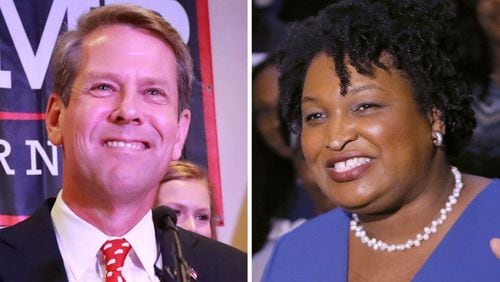The two candidates for Georgia governor want to invest heavily in education, but there are major differences between their proposals and questions about how they’d pay for them.
Republican Brian Kemp had said little about education until late September, when he pledged to raise teacher pay.
Democrat Stacey Abrams has talked about education for months and has a more comprehensive plan, which makes sense given the importance of public schools to Democratic voters. An Atlanta Journal-Constitution poll last month had the issue second only to healthcare for likely Georgia Democratic voters. Among Republicans, more saw jobs and immigration as priorities, with schooling on a par with healthcare and gun laws.
Women were twice as likely as men to rate public schools as a top priority, though, which could explain Kemp's recent emphasis. With weeks to go before the election, and with Abrams polling as more popular with women, he is moving to close the gender gap.
Also, there are more than 115,000 public school teachers in Georgia. Some believe Democrats lost their hold on the state’s highest office, in part, because of angry teachers. There are many reasons then-Gov. Roy Barnes lost re-election in 2002, including a change to the design of the state flag. But his opponent, Sonny Perdue, accused Barnes of blaming educators for school problems.
“The flag was a part of it, but I think part of it was also the alienation of teachers,” said veteran political observer Charles Bullock, who teaches at the University of Georgia. With the polls showing a neck-and-neck race for governor this year, the political science professor thinks Kemp is courting not only teachers, but also their spouses, grown children and other relatives. “I think it’s very much directed at the teacher camp.”
Abrams already had a head-start with teachers, earning the endorsement of the Georgia Association of Educators, the second largest educator advocacy group in the state.
Then, Kemp pledged to give teachers a permanent $5,000 pay raise. The cost is significant: $600 million. That doesn't appear to account for the additional pension and other benefit costs that accompany a pay bump. The raise would gobble much of the new tax revenue typically generated by a good economy. Rising school enrollment and healthcare prices would also eat at the budget, leaving little money for the new spending the candidates are proposing.
Abrams hasn't put a price tag on her plan, though she says one component — scholarships ensuring universal access to child care and schooling before pre-K — would cost about $300 million. She also wants expanded pre-K access, "competitive" teacher pay, bonuses for some teachers, reduced class sizes (which means hiring more educators), more money for busing, protected pensions, "strengthened" library systems, mental and medical health services for students, more arts and science education, and college loan repayments for teachers recruited to under-served parts of the state.
She talks in broad strokes about how she’d pay for all of this, though she does point to one specific source. She would eliminate $100 million in annual tax credits for donors to a private school scholarship fund.
Kemp, unlike Abrams, has embraced the tax-credit program. So has the General Assembly, which is controlled by his party. It’s unclear how Abrams would persuade them to eliminate it.
Frank Bennett, a businessman who put his kids through private school, backs Kemp. The owner of an extended day preschool in Cobb County called Kids R Kids fears Abrams will introduce more government regulation and bureaucracy for private schools like his. Kemp, on the other hand, “understands that small businesses play a vital role.”
Abrams has the support of Christie Stoermer, a Pike County resident who teaches third grade in a metro Atlanta school. She lives around people who are struggling financially, and says she could use a pay raise. But her priority is the kids in her high-poverty school who can barely read. That’s why she likes Abrams and her plan to expand access to education before kindergarten. “Her plan for preschool is critical,” she said.
Kemp says he’s talked to lawmakers about the cost of teacher raises and is sure he can find the money in the budget. “We’re going to make it happen,” he said.
He may have a better chance of getting his proposals through a GOP-dominated legislature. But Abrams, as a governor with veto power and influence over the budget, would also have leverage.
Abrams says she'll draw down federal funding where available, eliminate tax incentives "that no longer make sense" and collect sales taxes more efficiently.
“When you add those things together, we have a sufficient amount of revenue,” she said.
OUR REPORTING
The Atlanta Journal-Constitution will focus this week's election coverage on how the two major candidates for governor, Republican Brian Kemp and Democrat Stacey Abrams, plan to deal with key issues facing Georgia. Numerous AJC stories have already explored major issues such as health care, criminal justice and public safety. Look for more at ajc.com/politics as the state approaches Election Day on Nov. 6.
Sunday: Priorities in the state's budget
Monday: Problems facing rural Georgia
Tuesday: What needs to be done about education
Wednesday: Where candidates differ on social issues
Thursday: What's needed to improve transportation
Friday: Impact on the state's relations with the city of Atlanta
About the Author








